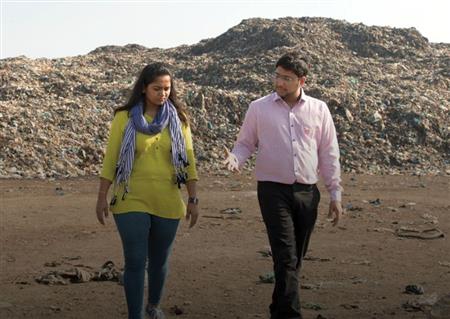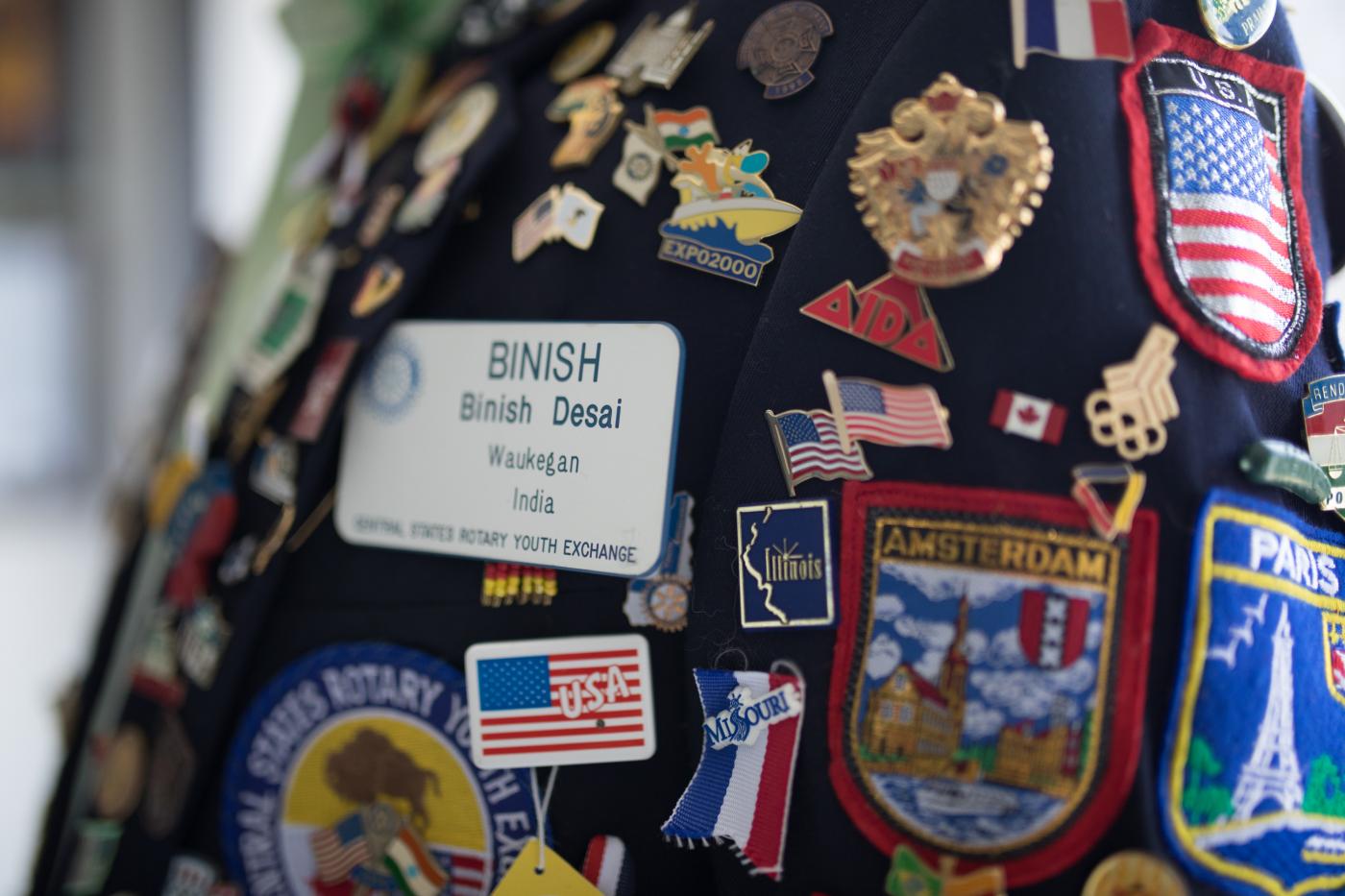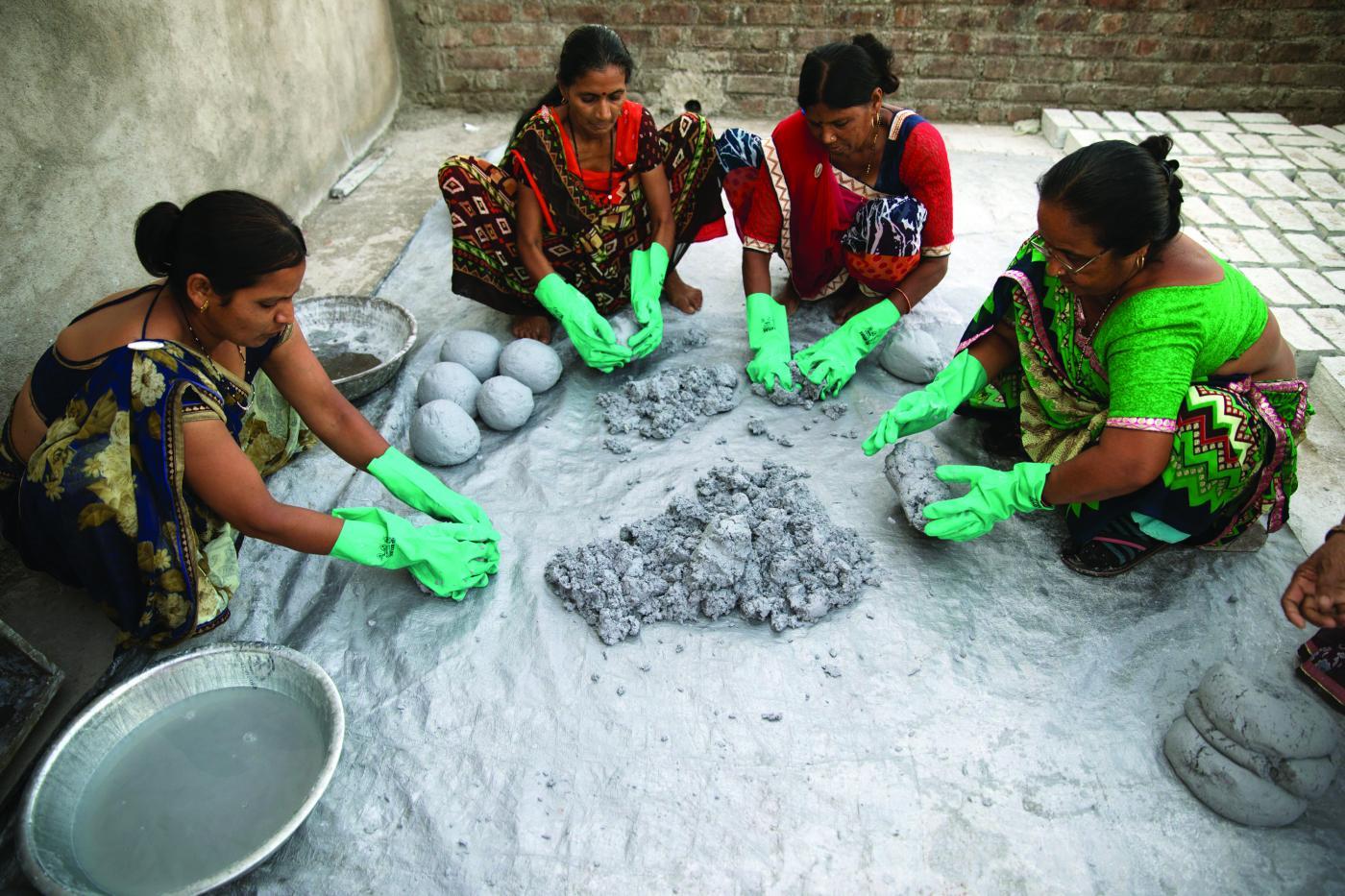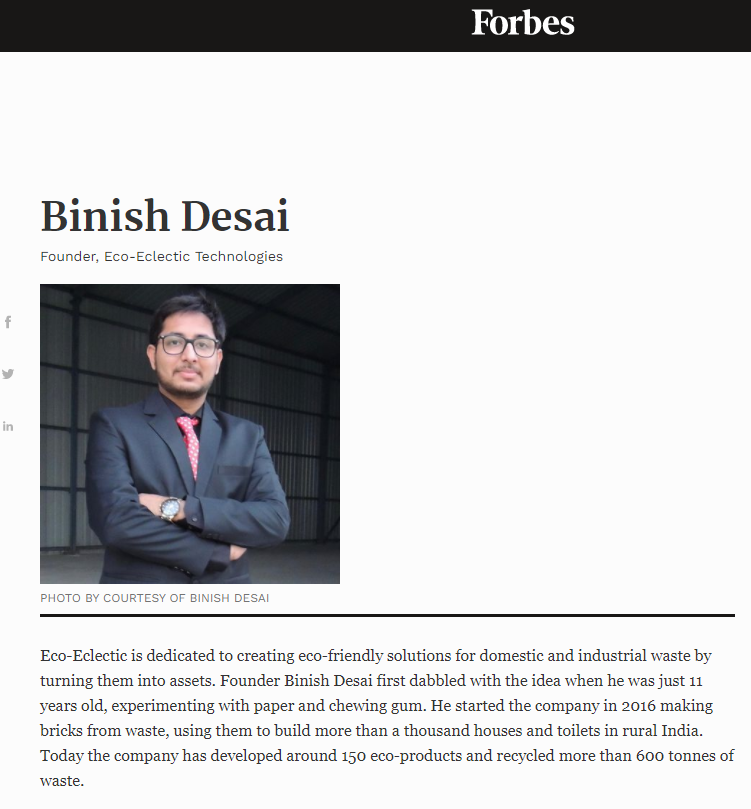
Binish Desai (shown on the right) began working on an eco-friendly brick made out of recycling and waste, when he was 11. The former Rotary Youth Exchange student, inventor, and entrepreneur credits Rotary with giving him the support to pursue his dreams. Now he’s giving back through a new Rotary club.
Every hero has an origin story. “I was 10 years old when the entire journey started,” explains Binish Desai. It began with a cartoon called Captain Planet, an animated TV series from the 1990s about an environmentalist with superpowers. Desai can  still recite the show’s refrain: Captain Planet, he’s our hero/Gonna take pollution down to zero! “That tagline stuck in my mind,” he says. “I wanted to do something to help Captain Planet.”
still recite the show’s refrain: Captain Planet, he’s our hero/Gonna take pollution down to zero! “That tagline stuck in my mind,” he says. “I wanted to do something to help Captain Planet.”
Growing up in Valsad, a city on the Arabian Sea in west-central India, Desai was also a fan of Dexter’s Laboratory, another animated TV show, this one about a boy scientist. “So I created my own lab in the corner of our living room in a TV cabinet. And I would always carry something called a ‘bag of ideas,’ where I would jot down different innovations of mine.”
For instance, having learned about evaporation and condensation in school, he noticed the steam that escaped from the pressure cooker when his mother prepared dinner. He created a device to capture that steam, which would then return to its liquid state — water that could be used for gardening. “That was my first invention ever,” he says.
“There is nothing that is useless in this world,” Desai insists. “The concept of waste does not exist in nature. It’s human consumption that creates it, so it’s our responsibility to get rid of it. And in the process of converting trash into treasure, we can also generate a lot of employment.”
In the nearly two decades since his Captain Planet days — Desai turns 27 this month — he has come up with more inventions; built and lost a company; founded, with his wife, several women’s empowerment centers; and generally concocted ways to improve the lives of everyone in his very broadly defined community. Central to his success has been his involvement with Rotary, a relationship that was sparked by a family connection and nurtured by a year in the United States as a Rotary Youth Exchange student. Now, as a charter member of the Rotary Club of Vibrant Valsad, his life in Rotary has taken flight.
Somebody hand that young man a cape.
Houses and toilets from recycled bricks
Desai used his bricks to build about 70 houses, but he found they were in even greater demand for the construction of public toilets. In 2014, Indian Prime Minister Narendra Modi had launched a nationwide campaign called Swachh Bharat Abhiyan, or the Clean India Mission. Its goal was to reduce litter, encourage recycling, and end the practice of open defecation. Because Desai could manufacture public toilets at 40 percent of what it cost his competitors, his product was in great demand.
Shown left, at a wom en’s empowerment center supported by the Rotary Club of Vibrant, women use Binish Desai’s special binder to create eco-friendly products from recycled paper waste.
en’s empowerment center supported by the Rotary Club of Vibrant, women use Binish Desai’s special binder to create eco-friendly products from recycled paper waste.
The toilets were also Desai’s ticket back into Rotary. “Rotary has been running in my veins ever since I was born,” he says. His grandfather was an honorary Rotarian, and since 1994 his father has been a member of the Rotary Club of Valsad, the same club Desai joined in 2015. As ever, he had grand ambitions. “It’s easy to become a Rotary member, but it’s very difficult to become a Rotarian,” he says. “I wanted to be a Rotarian.”
Desai began by proposing a sanitation project to the club’s president: installing two public toilets made with his bricks in a rural village near Valsad. His role model was none other than Rotary’s founder. As Desai recounts with some delight, “Paul Harris’ first service project was also a community toilet,” part of a “comfort station” movement in Chicago in 1907. The toilets in the village were the first of several that Desai would install with his club, but his experience there had a greater impact on his thinking than he expected.
“We call them women entrepreneurs, not women workers. To honor them, all of these products bear their fingerprints. It gives uniqueness to the products we make.”
As the Rotarians installed the toilet, a woman approached Desai. “Why are you building a toilet here?” she asked angrily. “I cannot feed my own daughters. How would I be able to maintain this thing?” Desai had no answer. He wanted to help her, but he didn’t know how. The answer would come in time.
Desai’s business thrived, but needing investors to provide the funds to fulfill his contracts to build toilets across India, he slowly lost control of his company. Ultimately he was forced out and left with nothing — except for his patent on the binder that was essential to the manufacture of his low-cost, environmentally friendly bricks. Desai started a new company, EcoEclectic Technologies, which works with industrial companies to recycle paper, plastic, and metal waste into products such as paving blocks and artificial wood panels. “That’s what I like to call a disruptive innovation,” he says. “It’s something that changes the perspective of people in a positive way. They start seeing things in a way that helps change the community. It’s not just about creating a particular product, but actually being helpful and breaking through the barriers that society has created.”
Starting a new Rotary club
 Desai analyzes his products by scrutinizing the “triple bottom line,” looking at things from financial, social, and environmental perspectives. “All three things together, kept under one balance,” he says. “That’s the basis of all our products.” That kind of thinking earned Desai a spot on Forbes’ 2018 list of Asia’s top social entrepreneurs under 30 (shown right). It also earned him a new sobriquet: the Waste Warrior.
Desai analyzes his products by scrutinizing the “triple bottom line,” looking at things from financial, social, and environmental perspectives. “All three things together, kept under one balance,” he says. “That’s the basis of all our products.” That kind of thinking earned Desai a spot on Forbes’ 2018 list of Asia’s top social entrepreneurs under 30 (shown right). It also earned him a new sobriquet: the Waste Warrior.
The new company also provided answers to the questions posed by the woman upset by the installation of a public toilet in her rural village. With his wife, Dhriti — the couple married in January 2019 — Desai founded a micro-social enterprise called Eco Lights Studio. The company employs women in rural India to make lamps, clocks, jewelry, and other products from industrial waste. The women work from their homes on their own schedule and earn significantly more than they would at the menial jobs otherwise available to them. “We call them women entrepreneurs, not women workers,” says Desai. “To honor them, all of these products bear their fingerprints. We highlight this. It gives uniqueness to the products we make.”
Desai had one more grand plan up his sleeve: “I got together 30 young professionals and I said, ‘Let’s start a new Rotary club and create a difference in the community.’” Chartered in October 2018 with a membership that included many second-generation Rotarians, the Rotary Club of Vibrant Valsad took on, as one of its first projects, the creation of a women’s empowerment center, a facility where local women can acquire the skills to make a better life for themselves and their families. Eco Lights Studio is a partner in the venture, and Desai intends it to serve as a model for women’s centers in other towns. Today, his once-trepidatious parents express pride in their son’s accomplishments.
“The main idea is not just to create employment, but also to uplift these women,” says the Waste Warrior. “It’s always been my goal to help someone in need. I hope to give back to Rotary and to the community what Rotary has given to me” — exactly as Captain Planet and Paul Harris would have it.
This story originally appeared in the August 2020 issue of The Rotarian magazine. Additional reporting by Andrew Chudzinski. Photography by Chaitali Mitra.
